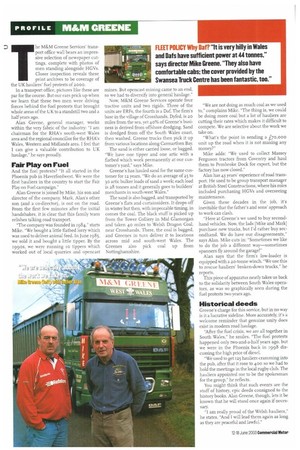D he M&M Greene Services trans
Page 48

If you've noticed an error in this article please click here to report it so we can fix it.
port office wall bears an impressive selection of newspaper cuttings, complete with photos of men standing alongside HGVs. Closer inspection reveals these print archives to be coverage of
the UK hauliers' fuel protests of 2000.
In a transport office, pictures like these are par for the course. But our ears prick up when we learn that these two men were driving forces behind the fuel protests that brought whole areas of the UK to a standstill two and a half years ago.
Alan Greene, general manager, works within the very fabric of the industry: "I am chairman for the RHA's south-west Wales area and the regional councillor for the RHA's Wales, Western and Midlands area. I feel that I can give a valuable contribution to UK haulage," he says proudly.
Fair Play on Fuel
And the fuel protests? "It all started in the Phoenix pub in Haverfordwest. We were the first hauliers in the country to start the Fair Play on Fuel campaign."
Alan Greene is joined by Mike, his son and director of the company. Mark, Alan's other son (and a co-director), is out on the road. From the first few minutes after the initial handshakes, it is clear that this family team relishes talking road transport.
"The company was founded in 1984," starts Mike. "We bought a little flatbed lorry which was used to deliver animal feed. In June 1985, we sold it and bought a little tipper. By the 1990s, we were running io tippers which worked out of local quarries and opencast mines. But opencast mining came to an end, so we had to diversify into general haulage."
Now, M&M Greene Services operate four tractive units and two rigids. Three of the units are ERFs, the fourth is a Dal The firm's base in the village of Crosshands, Dyfed, 15 20 miles from the sea, yet 40% of Greene's business is derived from offshore dredging. Sand is dredged from off the South Wales coast, then washed. Greene trucks then pick it up from various locations along Carmarthen Bay.
The sand is either carried loose, or bagged. "We have one tipper and one artic with a flatbed which work permanently at our customer's yard," says Mike.
Greene's has hauled sand for the same customer for 12 years. "We do an average of 25 to 30 artic bulker loads of sand a week; each load is 28 tonnes and it generally goes to builders' merchants in south-west Wales."
The sand is also bagged, and transported by Greene's flats and curtainsiders. It drops off in winter but then, with impeccable timing, in comes the coal. The black stuff is picked up from the Tower Colliery in Mid Glamorgan and taken 40 miles to Welsh Dragon Coal, near Crosshands. There, the coal is bagged, and Greenes in turn deliver it to locations across mid and south-west Wales. The Greenes also pick coal up from Nottinghamshire. "We are not doing as much coal as we used to," complains Mike. "The thing is, we could be doing more coal but a lot of hauliers are cutting their rates which makes it difficult to compete. We are selective about the work we take on.
"What's the point in sending a Z7o,000 unit up the road when it is not making any money?"
Mike adds: "We used to collect Massey Ferguson tractors from Coventry and haul them to Pembroke Dock for export, but the factory has now closed."
Alan has 43 years' experience of road transport. He used to be group transport manager at British Steel Constructions, where his roles included purchasing HGVs and overseeing maintenance.
Given these decades in the job, it's inevitable that the father's and sons' approach to work can clash.
"Here at Greene's we used to buy secondhand vehicles. Now, the lads [Mike and Mark] purchase new trucks, but I'd rather buy secondhand. We do have our disagreements," says Alan. Mike cuts in: "Sometimes we like to do the job a different way—sometimes spanners fly around the garage!"
Alan says that the firm's low-loader is equipped with a 20-tonne winch. "We use this to rescue hauliers' broken-down trucks," he reports.
This piece of apparatus neatly takes us back to the solidarity between South Wales operators, as was so graphically seen during the fuel protests two years ago.
Historical deeds
Greene's charge for this service, but in no way is it a lucrative sideline. More accurately, it's a welcome reminder that genuine unity does exist in modem road haulage.
"After the fuel crisis, we are all together in South Wales," he smiles. "The fuel protests happened only two-and-a-half years ago, but we were in the Phoenix back in 19 98 discussing the high price of diesel.
"We used to get 125 hauliers cramming into the pub, after that it rose to 400 so we had to hold the meetings in the local rugby club. The hauliers appointed me to be the spokesman for the group," he reflects.
You might think that such events are the stuff of history, epic deeds consigned to the history books. Alan Greene, though, lets it be known that he will stand once again if necessary.
"I am really proud of the Welsh hauliers," he states. "And I will lead them again as long as they are peaceful and lawful."












































































































































































